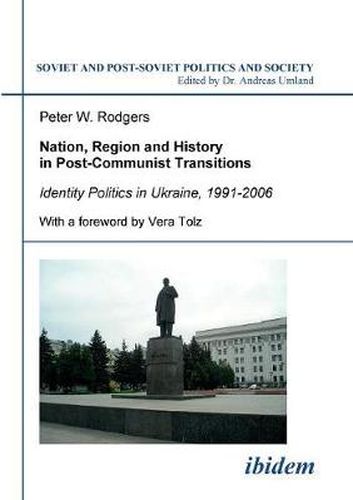Readings Newsletter
Become a Readings Member to make your shopping experience even easier.
Sign in or sign up for free!
You’re not far away from qualifying for FREE standard shipping within Australia
You’ve qualified for FREE standard shipping within Australia
The cart is loading…






This title is printed to order. This book may have been self-published. If so, we cannot guarantee the quality of the content. In the main most books will have gone through the editing process however some may not. We therefore suggest that you be aware of this before ordering this book. If in doubt check either the author or publisher’s details as we are unable to accept any returns unless they are faulty. Please contact us if you have any questions.
Since independence in 1991, issues of nation and identity have become highly debated topics in Ukraine. This monograph explores not only how national identity is being (re)constructed by the Ukrainian state, but also the processes by which it is negotiated through society. The central argument of this work is that too much attention, concerning identity in Ukraine, has focused on markers of ethnicity and language. Instead, the author advocates a regional approach, engaging with the issue of how Ukraine’s regional differences affect nation-building processes. Following the tumultuous events of the ‘Orange Revolution’, the view of Ukraine as a country inherently ‘divided’ between ‘East’ and ‘West’ has (re)emerged to become a popular explanation for political events. The study outlines the necessity for academics, policymakers and indeed politicians to veer away from this simplistic ‘West versus East’ divide. The book advocates an analysis of Ukraine’s unique brand of regionalism not in terms of divisions, but in terms of regional differences and diversity. The author deconstructs the concept of ‘Eastern Ukraine’ by focusing on three Ukrainian localities, all adjacent to the Ukrainian-Russian border. The study examines how individuals provide ‘their’ own understanding of the place of their region within the wider processes of nation building across Ukraine. In doing so, the book develops a ‘regional’ approach to the study of identity politics in Ukraine.
$9.00 standard shipping within Australia
FREE standard shipping within Australia for orders over $100.00
Express & International shipping calculated at checkout
This title is printed to order. This book may have been self-published. If so, we cannot guarantee the quality of the content. In the main most books will have gone through the editing process however some may not. We therefore suggest that you be aware of this before ordering this book. If in doubt check either the author or publisher’s details as we are unable to accept any returns unless they are faulty. Please contact us if you have any questions.
Since independence in 1991, issues of nation and identity have become highly debated topics in Ukraine. This monograph explores not only how national identity is being (re)constructed by the Ukrainian state, but also the processes by which it is negotiated through society. The central argument of this work is that too much attention, concerning identity in Ukraine, has focused on markers of ethnicity and language. Instead, the author advocates a regional approach, engaging with the issue of how Ukraine’s regional differences affect nation-building processes. Following the tumultuous events of the ‘Orange Revolution’, the view of Ukraine as a country inherently ‘divided’ between ‘East’ and ‘West’ has (re)emerged to become a popular explanation for political events. The study outlines the necessity for academics, policymakers and indeed politicians to veer away from this simplistic ‘West versus East’ divide. The book advocates an analysis of Ukraine’s unique brand of regionalism not in terms of divisions, but in terms of regional differences and diversity. The author deconstructs the concept of ‘Eastern Ukraine’ by focusing on three Ukrainian localities, all adjacent to the Ukrainian-Russian border. The study examines how individuals provide ‘their’ own understanding of the place of their region within the wider processes of nation building across Ukraine. In doing so, the book develops a ‘regional’ approach to the study of identity politics in Ukraine.